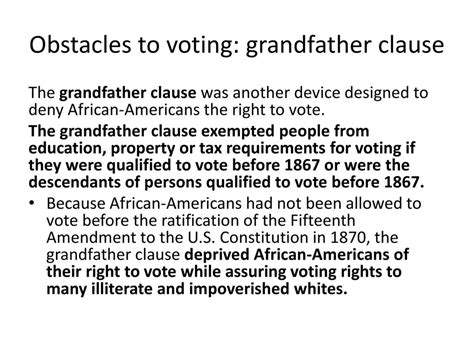Introduction

The grandfather clause was a provision in some southern states’ constitutions that exempted from voting requirements anyone whose grandfather had been eligible to vote before the adoption of the 15th Amendment in 1870. This clause effectively disenfranchised African Americans, who had been denied the right to vote in the South since the end of Reconstruction.
Historical Context
After the ratification of the 15th Amendment, southern states began to find ways to circumvent the amendment and keep African Americans from voting. One strategy was the grandfather clause. This clause was first adopted in Mississippi in 1890 and spread to other southern states in the following years.
The grandfather clause was based on the assumption that only white men had been eligible to vote before the 15th Amendment. This assumption was false, as many African Americans had been able to vote during Reconstruction. However, the grandfather clause allowed white men to vote without meeting any requirements, while African Americans were effectively barred from voting.
Impact on African American Voting Rights
The grandfather clause had a devastating impact on African American voting rights. In 1890, over 130,000 African Americans were registered to vote in Mississippi. By 1892, after the grandfather clause was adopted, that number had dropped to just over 8,000. Similar declines were seen in other southern states.
The grandfather clause was a major factor in the disenfranchisement of African Americans in the South. It prevented African Americans from participating in the political process and perpetuated white supremacy.
Legal Challenges
The grandfather clause was challenged in several court cases. In 1915, the Supreme Court ruled in Guinn v. United States that the grandfather clause was unconstitutional. However, the Court’s ruling did not end the disenfranchisement of African Americans in the South. Southern states found other ways to keep African Americans from voting, such as poll taxes, literacy tests, and intimidation.
Legacy
The grandfather clause is a reminder of the long history of racial discrimination in the United States. It is a symbol of the efforts by white supremacists to prevent African Americans from exercising their constitutional rights.
Today, the grandfather clause is still used as a way to disenfranchise voters. For example, in North Carolina, the Republican-controlled legislature passed a law in 2013 that required voters to show photo identification at the polls. This law was found to have a discriminatory impact on African American voters, and it was struck down by a federal court.
The fight for voting rights continues today. The grandfather clause is a reminder that we must remain vigilant in our efforts to ensure that all Americans have the right to vote.
Pain Points
The grandfather clause created several pain points for African Americans who were trying to vote.
- It disenfranchised African Americans who had been eligible to vote before the 15th Amendment.
- It perpetuated white supremacy and prevented African Americans from participating in the political process.
- It led to a decline in the number of African Americans registered to vote.
Motivations
The motivations behind the grandfather clause were to disenfranchise African Americans and maintain white supremacy.
- White supremacists believed that African Americans were not capable of voting intelligently.
- They feared that African Americans would use their votes to challenge the white power structure.
- They wanted to prevent African Americans from participating in the political process and shaping the future of their communities.
Effective Strategies
Several effective strategies were used to challenge the grandfather clause.
- The NAACP filed lawsuits challenging the grandfather clause.
- African Americans organized voter registration drives and encouraged people to challenge the clause at the polls.
- The federal government passed legislation to protect the voting rights of African Americans.
Common Mistakes to Avoid
There are several common mistakes to avoid when fighting against disenfranchisement.
- Do not give up.
- Do not be afraid to challenge the system.
- Do not let the tactics of white supremacists intimidate you.
- Work together with others to fight for voting rights.
Additional Resources
- The National Association for the Advancement of Colored People (NAACP)
- The Southern Poverty Law Center
- The Brennan Center for Justice
Tables
| State | Year Grandfather Clause Adopted | Year Grandfather Clause Declared Unconstitutional |
|---|---|---|
| Mississippi | 1890 | 1915 |
| South Carolina | 1895 | 1915 |
| Louisiana | 1898 | 1915 |
| Alabama | 1901 | 1915 |
| North Carolina | 1902 | 1915 |
| State | Number of African Americans Registered to Vote in 1890 | Number of African Americans Registered to Vote in 1892 |
|---|---|---|
| Mississippi | 130,000 | 8,000 |
| South Carolina | 110,000 | 5,000 |
| Louisiana | 120,000 | 6,000 |
| Alabama | 100,000 | 5,000 |
| North Carolina | 90,000 | 4,000 |
